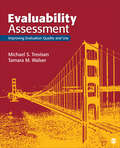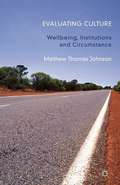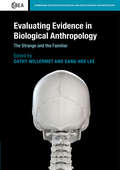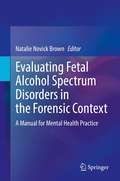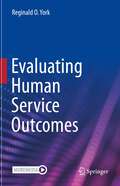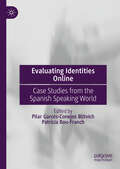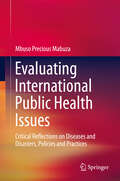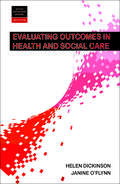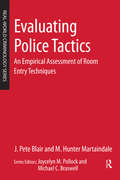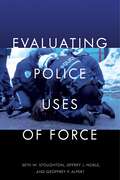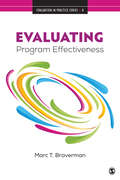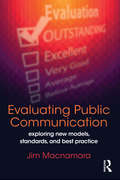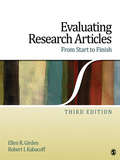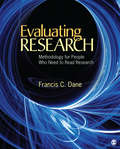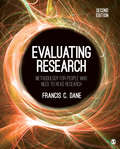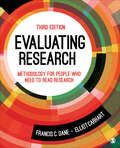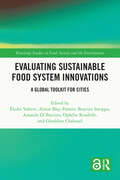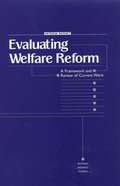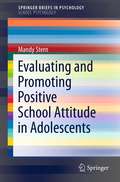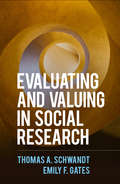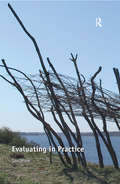- Table View
- List View
Evaluability Assessment: Improving Evaluation Quality and Use
by Michael S. Trevisan Tamara M. WalserEvaluability assessment (EA) can lead to development of sound program theory, increased stakeholder involvement and empowerment, better understanding of program culture and context, enhanced collaboration and communication, process and findings use, and organizational learning and evaluation capacity building. This book provides an up-to-date treatment of EA, clarifies what it actually is and how it can be used, demonstrates EA as an approach to evaluative inquiry with multidisciplinary and global appeal, and identifies and describes the purposes and benefits to using EA. Using case examples contributed by EA practitioners, the text illustrates important features of EA use, and showcases how EA is used in a variety of disciplines and evaluation contexts. This text is appropriate as an instructional text for graduate level evaluation courses and training, and as a resource for evaluation practitioners, policymakers, funding agencies, and professional training.
Evaluating Culture
by Matthew Thomas JohnsonFrom which evaluative base should we develop policies designed to promote wellbeing among different cultural groups in varying circumstances? This book engages with needs and capabilities to advance normative functionalist assessment of the success with which cultural institutions promote eudaemonic wellbeing in given, determinate circumstances.
Evaluating Evidence in Biological Anthropology: The Strange and the Familiar (Cambridge Studies in Biological and Evolutionary Anthropology #83)
by Sang-Hee Lee Cathy WillermetBiological anthropology is a diverse field, with countless research methods and techniques in different sub-disciplines. This book takes a critical perspective to the current state of the field, exploring theory and practice in paleoanthropology, bioarchaeology, and ecology. Contributors challenge how evidence is discovered, collected and interpreted, and explain that researchers gain insights by de-familiarizing themselves from well-known methods and taking a different perspective - 'making the familiar strange'. The book covers how researchers' biases and assumptions affect the interpretation of topics such as human evolution and population movements; race, health, and disability; bodies and embodiment; and landscapes and ecology. A final chapter includes a critical assessment of new thinking about technology, in addition to the multilayered and complex nature of both research questions and evidence. This is an insightful text for researchers and graduate students in anthropology, biology, ecology, history and philosophy of science.
Evaluating Fetal Alcohol Spectrum Disorders in the Forensic Context: A Manual for Mental Health Practice
by Natalie Novick BrownThis book is intended for medical and mental health clinicians faced with the challenge of evaluating adolescents and adults in the legal context who may have a fetal alcohol spectrum disorder (FASD). Luminaries in their respective fields, the contributors to this book offer a range of expertise and perspectives regarding the forensic investigation of FASD: medical, psychological, psychiatric, criminal defense, prosecution, and the judiciary. The primary goal of the book is to provide medical and mental health clinicians with practical procedures that can be used in a variety of forensic and clinical settings. It includes protocols that have been used successfully in legal matters ranging from rights waiver and competency to capital murder and sexual offending. It not only provides detailed guidelines for interviewing birth mothers about the delicate topic of substance use during pregnancy but also introduces a methodology that can be used in the absence of exposure confirmation to arrive at a sound diagnostic conclusion through the process of differential diagnosis. Taken as a whole, the methodological procedures described by the contributors to the book serve as ‘best practices’ for comprehensive forensic mental health evaluation of potential FASD in juveniles and adult defendants as well as in victims.
Evaluating Human Service Outcomes
by Reginald O. YorkThis all-in-one text assists human service practitioners, and the students of human service educational programs, in the evaluation of their practice with their clients. It takes readers through the entire research process, step by step, starting with the literature review on the nature of the behavior being served, to the development of their study methods, to the statistical analysis of data using the internet and, finally, to the drawing of conclusions based on the outcome study that was conducted. When readers complete this book, they will be prepared to conduct an outcome evaluation study and to present a report to their agencies or instructors. Key distinctions of this text include: guides for analysis of data using Excel, the internet or SPSS for statistical analysis of data; the separation of content into basic concepts and intermediate concepts for use in beginning and intermediate courses in human service research methods; an instructor's manual that offers outlines, lists, and test questions additional to those in the text; a student workbook with practice assignments for use in courses as well as a set of checklists that serve as a guide for various tasks in the research process; and objectives, summaries, and tests in all chapters. Evaluating Human Service Outcomes could be used as the basic text for a beginning course in human service research in educational programs in social work, counseling, and psychology where a major goal is to complete a research study. It could also be used as a supplemental text for advanced research courses that include the analysis of data. The text also should be of interest to human service practitioners who are working in programs funded by grants that require outcome evaluation.
Evaluating Identities Online: Case Studies from the Spanish Speaking World
by Pilar Garcés-Conejos Blitvich Patricia Bou-FranchThis book examines how identities are constructed in digital, multimodal discourse, and how these identities (gender, age, race, ethnicity, professional, etc.) are generally evaluated as they are claimed, attributed, verified, and non-verified intersubjectively in a polymedia space. Although the construction of online identity has been addressed in the literature, the online construction of identity in the Spanish speaking world has received less focused attention. This volume contains chapters by renowned specialists in pragmatics and digital communication, and is the most recent output of an ongoing externally funded project (UPO-1380703). The book includes a state-of-the-art introduction by the editors followed by three main sections: the first is devoted to examining digital identifies in conflict; the second addresses self-presentation on Twitter and Instagram, with a special focus on politics and gender; and finally, the third addresses identity construction in the genre of online reviews. All of the chapters address self and other identity construction in contexts of both convergence and controversy, in a variety of digital social platforms and practices related to gender, age, political stance, race, ethnicity, and lifestyle. Further, many of these chapters approach identity construction from a contrastive perspective, and thus address variation. This book will be of interest to scholars, researchers, graduate, and advanced undergraduate students in sociolinguistics, (contrastive) pragmatics, discourse analysis, media studies, linguistic anthropology, and communication studies, among others.
Evaluating International Public Health Issues: Critical Reflections on Diseases and Disasters, Policies and Practices
by Mbuso Precious MabuzaThis book makes an original contribution in addressing contemporary critical discussions and reflections on international health policies, strategies, programmes, systems, diseases, disasters, and public health issues. It includes reflections on how levels of governance, development and technical assistance affect countries’ disaster readiness and health systems. In addressing inequalities between the rich and the poor, and unpacking how this affects public health services, policies, strategies and their collective implementation, the book aspires to improve standards of public health and quality of life for sustainable development globally. It provides a comprehensive overview of international health policies and aid structures, and pays particularly close attention to policies on HIV/AIDS in the workplace, discussing how HIV/AIDS has overshadowed non-communicable diseases (NCDs) such as hypertension and stroke, which are on the rise. This book will be of great benefit to students and researchers, as well as policymakers in governmental and non-governmental organisations, who have an interest in achieving greater sustainability and improved health for populations in low-, middle- and high-income countries. It will be an indispensable book for students in Public Health programmes, and related courses.
Evaluating Outcomes in Health and Social Care 2e
by Helen Dickinson Janine O'FlynnIn recent years collaborative working has moved from being an optional extra of public service practice to being a core competency for individuals and teams. Has this led to better outcomes for those who use services? How to understand and to measure these outcomes and demonstrate these to a variety of different audiences remains a significant challenge for many. This revised edition of this bestselling textbook includes the latest research findings and contains more tools, frameworks and international examples of best practice to aid practitioners to more effectively evaluate partnerships. Up-to-date research evidence is presented in a practical and helpful way, making this an essential resource for students.
Evaluating Police Tactics: An Empirical Assessment of Room Entry Techniques
by J. Pete Blair M. Hunter MartaindaleThe approach that should be used by law enforcement officers in order to safely and effectively enter a room is a point of contention among many police trainers. Based on five experiments conducted over a two-year period, Evaluating Police Tactics demonstrates that the conventional wisdom is not optimal. Using the scientific method to systematically assess current room entry philosophies and techniques employed by police, Evaluating Police Tactics offers suggestions for examining the current philosophies and determining how patrol officers can enter scenes of ongoing violence, find the shooter, and stop the killing as safely and effectively as possible. About the Real-World Criminology Series More than just textbooks, the short books in the Real-World Criminology series are designed to be of interest to particular fields within criminology. They can be policy primers, spurring innovations in policing and corrections, theoretical works dealing with policy implications, or program evaluations incorporating theoretical foundations. Each book covers something that is happening –or should be happening—in the world of criminal justice.
Evaluating Police Uses of Force
by Seth W. Stoughton Jeffrey J. Noble Geoffrey P. AlpertProvides a critical understanding and evaluation of police tactics and the use of forcePolice violence has historically played an important role in shaping public attitudes toward the government. Community trust and confidence in policing have been undermined by the perception that officers are using force unnecessarily, too frequently, or in problematic ways. The use of force, or harm suffered by a community as a result of such force, can also serve as a flashpoint, a spark that ignites long-simmering community hostility.In Evaluating Police Uses of Force, legal scholar Seth W. Stoughton, former deputy chief of police Jeffrey J. Noble, and distinguished criminologist Geoffrey P. Alpert explore a critical but largely overlooked facet of the difficult and controversial issues of police violence and accountability: how does society evaluate use-of-force incidents? By leading readers through answers to this question from four different perspectives—constitutional law, state law, administrative regulation, and community expectations—and by providing critical information about police tactics and force options that are implicated within those frameworks, Evaluating Police Uses of Force helps situate readers within broader conversations about governmental accountability, the role that police play in modern society, and how officers should go about fulfilling their duties.
Evaluating Program Effectiveness: Validity and Decision-Making in Outcome Evaluation (Evaluation in Practice Series)
by Marc T. BravermanThe book shows how to apply validity concepts when planning and conducting an evaluation, thereby making sure that the evaluation stays true to the purposes for which it was initiated. Marc T. Braverman demonstrates that evaluating with validity means being able to answer the evaluation questions in a way that is useful, accurate, and reflective of the information needed from the evaluation. His approach is practical, with the goal of helping evaluators to conduct high-quality outcome evaluations, and he illustrates concepts with case study examples drawn from studies of intervention effectiveness over many years. The book begins by looking at the ways that validity is conceptualized and the uses to which it is put. Subsequent chapters analyze separate phases of the outcome evaluation process and the critical decisions about design and analysis that are typically required.
Evaluating Program Effectiveness: Validity and Decision-Making in Outcome Evaluation (Evaluation in Practice Series)
by Marc T. BravermanThe book shows how to apply validity concepts when planning and conducting an evaluation, thereby making sure that the evaluation stays true to the purposes for which it was initiated. Marc T. Braverman demonstrates that evaluating with validity means being able to answer the evaluation questions in a way that is useful, accurate, and reflective of the information needed from the evaluation. His approach is practical, with the goal of helping evaluators to conduct high-quality outcome evaluations, and he illustrates concepts with case study examples drawn from studies of intervention effectiveness over many years. The book begins by looking at the ways that validity is conceptualized and the uses to which it is put. Subsequent chapters analyze separate phases of the outcome evaluation process and the critical decisions about design and analysis that are typically required.
Evaluating Public Communication: Exploring New Models, Standards, and Best Practice
by Jim MacnamaraEvaluating Public Communication addresses the widely reported lack of rigorous outcome and impact-oriented evaluation in advertising; public relations; corporate, government, political and organizational communication and specialist fields, such as health communication. This transdisciplinary analysis integrates research literature from each of these fields of practice, as well as interviews, content analysis and ethnography, to identify the latest models and approaches. Chapters feature: • a review of 30 frameworks and models that inform processes for evaluation in communication, including the latest recommendations of industry bodies, evaluation councils and research institutes in several countries; • recommendations for standards based on contemporary social science research and industry initiatives, such as the IPR Task Force on Standards and the Coalition for Public Relations Research Standards; • an assessment of metrics that can inform evaluation, including digital and social media metrics, 10 informal research methods and over 30 formal research methods for evaluating public communication; • evaluation of public communication campaigns and projects in 12 contemporary case studies. Evaluating Public Communication provides clear guidance on theory and practice for students, researchers and professionals in PR, advertising and all fields of communication.
Evaluating Research Articles From Start to Finish
by Ellen Robinson Girden Robert Ira KabacoffThis thoroughly updated new edition of the bestselling text trains students—potential researchers and consumers of research—to critically read a research article from start to finish. Containing 25 engaging samples of ideal and flawed research, the text helps students assess the soundness of the design and appropriateness of the statistical analyses.
Evaluating Research: Methodology for People Who Need to Read Research
by Dr Francis C. DaneEvaluating Research: Methodology for People Who Need to Read Research, Second Edition by Francis C. Dane offers readers a straightforward presentation of the key components of research and the skills they need to read and evaluate it. The book covers a range of research that students are most likely to encounter, from experimental to field research, and archival to evaluation research. The Second Edition features updated examples of research across disciplines, new and updated content on qualitative research and conceptual statistics, and a streamlined organization that better aligns with the order of information in a research article.
Evaluating Research: Methodology for People Who Need to Read Research
by Dr Francis C. DaneEvaluating Research: Methodology for People Who Need to Read Research, Second Edition by Francis C. Dane offers readers a straightforward presentation of the key components of research and the skills they need to read and evaluate it. The book covers a range of research that students are most likely to encounter, from experimental to field research, and archival to evaluation research. The Second Edition features updated examples of research across disciplines, new and updated content on qualitative research and conceptual statistics, and a streamlined organization that better aligns with the order of information in a research article.
Evaluating Research: Methodology for People Who Need to Read Research
by Dr Francis C. DaneEvaluating Research: Methodology for People Who Need to Read Research, Second Edition by Francis C. Dane offers readers a straightforward presentation of the key components of research and the skills they need to read and evaluate it. The book covers a range of research that students are most likely to encounter, from experimental to field research, and archival to evaluation research. The Second Edition features updated examples of research across disciplines, new and updated content on qualitative research and conceptual statistics, and a streamlined organization that better aligns with the order of information in a research article.
Evaluating Research: Methodology for People Who Need to Read Research
by Francis C. Dane Elliot Donald CarhartThe third edition of Evaluating Research by Francis C. Dane and Elliot Carhart provides students with the skills to read and evaluate research studies. Aimed at courses where it is more important for students to develop an understanding of methods, rather than conduct their own research, this book covers all aspects of reading social, behavioral, and health science research from the basics, such as the structure of reports and accessing research, as well as overviews of the main types of research methods. The authors emphasize critical reading skills to enable students to become experts in evaluating research, so students can decide whether to incorporate that research into their future professional activities. Each chapter includes an overview at the beginning and exercises at the end to reinforce the content learned. Starting from the basic principles of why we do research, the book moves readers through the practicalities of finding studies to the principles of the scientific method and how to break down and analyze research reports. New to the third edition, Understanding Checks placed throughout each chapter help students cement their learning. The organization of the book is now more logical, with a new chapter on accessing research up front and ending with a chapter on statistical analyses. New research examples throughout, including such topical examples as mindfulness, college attendance, and bias in healthcare, help students see the relevance of research in their lives.
Evaluating Research: Methodology for People Who Need to Read Research
by Francis C. Dane Elliot Donald CarhartThe third edition of Evaluating Research by Francis C. Dane and Elliot Carhart provides students with the skills to read and evaluate research studies. Aimed at courses where it is more important for students to develop an understanding of methods, rather than conduct their own research, this book covers all aspects of reading social, behavioral, and health science research from the basics, such as the structure of reports and accessing research, as well as overviews of the main types of research methods. The authors emphasize critical reading skills to enable students to become experts in evaluating research, so students can decide whether to incorporate that research into their future professional activities. Each chapter includes an overview at the beginning and exercises at the end to reinforce the content learned. Starting from the basic principles of why we do research, the book moves readers through the practicalities of finding studies to the principles of the scientific method and how to break down and analyze research reports. New to the third edition, Understanding Checks placed throughout each chapter help students cement their learning. The organization of the book is now more logical, with a new chapter on accessing research up front and ending with a chapter on statistical analyses. New research examples throughout, including such topical examples as mindfulness, college attendance, and bias in healthcare, help students see the relevance of research in their lives.
Evaluating Sustainable Food System Innovations: A Global Toolkit for Cities (Routledge Studies in Food, Society and the Environment)
by Alison Blay-Palmer Élodie Valette Amanda Di Battista Beatrice Intoppa Ophélie Roudelle Géraldine ChaboudThis book presents URBAL, an approach that applies impact pathway mapping to understand how food system innovations in cities, and their territories, change and impact food system sustainability. Around the world, people are finding innovative ways to make their food systems more sustainable. However, documenting and understanding how these innovations impact the sustainability of food system can be a challenge. The Urban Driven Innovations for Sustainable Food Systems (URBAL) methodology responds to these constraints by providing innovations with a simple, open-source, resource-efficient tool that is easily appropriated and adaptable to different contexts. URBAL is designed to respond to the demands of field stakeholders, whether public or private, to accompany and guide them in their actions and decision-making with regard to sustainability objectives. This book presents this qualitative and participatory impact assessment method of food innovations and applies it to several cases of food innovation around the world, including the impact of agricultural districts in Milan, chefs and gastronomy in Brasilia, e-commerce in Vietnam, eco-friendly farm systems in Berlin and The Nourish to Flourish governance process in Cape Town. The book demonstrates how food innovations can impact different dimensions of sustainability, positively and negatively, and identify the elements that facilitate or hinder these impacts. The volume reflects on how to strengthen the capacity of these stakeholders to disseminate their innovations on other scales to contribute to the transition towards more sustainable food systems. This book will be of great interest to students and scholars working on sustainable food systems, urban food, food innovation and impact assessment, as well as policymakers, practitioners and funders interested in these areas.
Evaluating Welfare Reform: A Framework and Review of Current Work
by Panel On Data Methods for Measuring the Effects of Changes in Social Welfare ProgramsThe National Academies Press (NAP)--publisher for the National Academies--publishes more than 200 books a year offering the most authoritative views, definitive information, and groundbreaking recommendations on a wide range of topics in science, engineering, and health. Our books are unique in that they are authored by the nation's leading experts in every scientific field.
Evaluating and Promoting Positive School Attitude in Adolescents
by Mandy SternAt a time when rates of depression and other mental health problems are increasing significantly among high school students, measures of school attitude and well-being are of central importance to school practitioners. Students with positive attitudes about school experience more beneficial outcomes and are also less likely to engage in maladaptive, risky behaviors. Therefore, monitoring how students feel about their experiences at school is important, and a novel, fresh approach to examining school attitude is sorely needed. Past studies of school attitude have generally focused on internal, psychological correlates of school attitude, such as individual and subjective reports of students' attitude toward school and their motivation levels. Evaluating and Promoting Positive School Attitude in Adolescents goes beyond these traditional measurements and explores less psychologically focused indicators, including ecological factors and observable behaviors. This study provides school psychologists with a new, comprehensive, and ecologically based approach with which to evaluate the school attitude of high school students.
Evaluating and Valuing in Social Research
by Thomas A. Schwandt Emily F. GatesMuch applied research takes place as if complex social problems--and evaluations of interventions to address them--can be dealt with in a purely technical way. In contrast, this groundbreaking book offers an alternative approach that incorporates sustained, systematic reflection about researchers' values, what values research promotes, how decisions about what to value are made and by whom, and how judging the value of social interventions takes place. The authors offer practical and conceptual guidance to help researchers engage meaningfully with value conflicts and refine their capacity to engage in deliberative argumentation. Pedagogical features include a detailed evaluation case, "Bridge to Practice" exercises and annotated resources in most chapters, and an end-of-book glossary.
Evaluating in Practice
by Ian ShawEvaluation is not a self-contained phase of social work practice - one more dimension of the process - but a dimension of every phase. In this fully rewritten and updated second edition of his groundbreaking text Evaluating in Practice, Ian Shaw demonstrates how evaluation and inquiry are just as much practice tasks as planning, intervention and review. By demonstrating that good evaluating in practice helps sustain a commitment to evidence, understanding and justice, Shaw shows that for this to be achieved, evaluating in practice must permeate every aspect of social work. He: 1. Develops a framework for embedding evaluation and inquiry as a dimension of good practice in social work. 2. Demonstrates the central significance of a 'methodological practice' in social work that adapts, infuses, and translates social research methods as a dimension of the different aspects of social work, viz. assessment, planning, intervention, review and outcomes. 3. Facilitates good practice by exemplifying the argument through extensive worked examples and exercises. This book has much to say about the demanding skills that are necessary to achieve this shaping of practice and is a must-read for any social work student or practitioner.
Evaluating the "Keep Your Health Plan Fix": Implications for the Affordable Care Act Compared to Legislative Alternatives
by Christine Eibner Evan SaltzmanThis report describes a comparative analysis of three proposals to allow Americans to keep their existing health plans under the Affordable Care Act (ACA). The proposals are evaluated based on their potential impact on the ACA-compliant market and the cost and coverage of health insurance. The possibility of each proposal causing a “death spiral” in the ACA-compliant market is also addressed.
